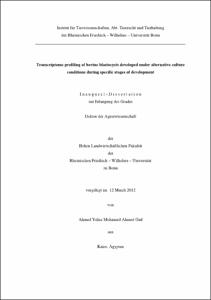Gad, Ahmed Yehia Mohamed Ahmed: Transcriptome profiling of bovine blastocysts developed under alternative culture conditions during specific stages of development. - Bonn, 2012. - Dissertation, Rheinische Friedrich-Wilhelms-Universität Bonn.
Online-Ausgabe in bonndoc: https://nbn-resolving.org/urn:nbn:de:hbz:5n-28537
Online-Ausgabe in bonndoc: https://nbn-resolving.org/urn:nbn:de:hbz:5n-28537
@phdthesis{handle:20.500.11811/5104,
urn: https://nbn-resolving.org/urn:nbn:de:hbz:5n-28537,
author = {{Ahmed Yehia Mohamed Ahmed Gad}},
title = {Transcriptome profiling of bovine blastocysts developed under alternative culture conditions during specific stages of development},
school = {Rheinische Friedrich-Wilhelms-Universität Bonn},
year = 2012,
month = may,
note = {The aim of this study was to determine the influences of different environmental conditions during specific stages of early bovine embryos on the transcriptome profile of produced blastocysts and subsequent effects on molecular mechanisms and pathways controlling embryo development. Using the advent of transvaginal endoscopy-mediated technology, different bovine blastocyst groups were produced under alternative culture conditions. In the first experiment, transcriptome analysis was performed between day 7 blastocysts which were developed either in superovulated heifers (High P4) or in unstimulated recipients (Normal P4) from day 2 onward using Affymetrix GeneChip Bovine Genome Array. In the second experiment, four different blastocyst groups were produced under alternative in vivo and in vitro culture conditions before or after major embryonic genome activation (EGA) stage. Completely in vitro and in vivo produced blastocysts were used as contrasts. Transcriptome profile of each blastocyst group has been compared to in vivo control group using EmbryoGENE’s bovine microarray. Abnormal environmental conditions either in vivo or in vitro showed a dramatic effect on the transcriptome profiles of produced blastocysts. A total of 454 genes were differentially regulated between blastocysts derived from superovulated animals and those which cultured in unstimulated recipients from day 2. Blastocysts which developed under high P4 conditions due to superovulation treatment showed higher cellular and metabolic activities, as genes involved in the oxidative phosphorylation pathway and different metabolic processes, in addition to genes expressed in response to stress, were highly expressed compared to embryos which developed in the oviduct of unstimulated animals. In vitro culture conditions during EGA stage have critically influenced gene expression patterns, irrespective to embryo origin. Compared to complete in vivo group, blastocyst groups which spent EGA stage under in vitro conditions showed higher number of differentially regulated genes than those which spent EGA stage under in vivo conditions. Ontological classification showed a clear contrast in expression patterns for lipid metabolism and oxidative stress between blastocysts generated in vivo vs. in vitro, with opposite trends. These results will help for future efforts to modify culture conditions at the critical stages of development which will allow more efficient production of developmentally competent blastocysts.},
url = {https://hdl.handle.net/20.500.11811/5104}
}
urn: https://nbn-resolving.org/urn:nbn:de:hbz:5n-28537,
author = {{Ahmed Yehia Mohamed Ahmed Gad}},
title = {Transcriptome profiling of bovine blastocysts developed under alternative culture conditions during specific stages of development},
school = {Rheinische Friedrich-Wilhelms-Universität Bonn},
year = 2012,
month = may,
note = {The aim of this study was to determine the influences of different environmental conditions during specific stages of early bovine embryos on the transcriptome profile of produced blastocysts and subsequent effects on molecular mechanisms and pathways controlling embryo development. Using the advent of transvaginal endoscopy-mediated technology, different bovine blastocyst groups were produced under alternative culture conditions. In the first experiment, transcriptome analysis was performed between day 7 blastocysts which were developed either in superovulated heifers (High P4) or in unstimulated recipients (Normal P4) from day 2 onward using Affymetrix GeneChip Bovine Genome Array. In the second experiment, four different blastocyst groups were produced under alternative in vivo and in vitro culture conditions before or after major embryonic genome activation (EGA) stage. Completely in vitro and in vivo produced blastocysts were used as contrasts. Transcriptome profile of each blastocyst group has been compared to in vivo control group using EmbryoGENE’s bovine microarray. Abnormal environmental conditions either in vivo or in vitro showed a dramatic effect on the transcriptome profiles of produced blastocysts. A total of 454 genes were differentially regulated between blastocysts derived from superovulated animals and those which cultured in unstimulated recipients from day 2. Blastocysts which developed under high P4 conditions due to superovulation treatment showed higher cellular and metabolic activities, as genes involved in the oxidative phosphorylation pathway and different metabolic processes, in addition to genes expressed in response to stress, were highly expressed compared to embryos which developed in the oviduct of unstimulated animals. In vitro culture conditions during EGA stage have critically influenced gene expression patterns, irrespective to embryo origin. Compared to complete in vivo group, blastocyst groups which spent EGA stage under in vitro conditions showed higher number of differentially regulated genes than those which spent EGA stage under in vivo conditions. Ontological classification showed a clear contrast in expression patterns for lipid metabolism and oxidative stress between blastocysts generated in vivo vs. in vitro, with opposite trends. These results will help for future efforts to modify culture conditions at the critical stages of development which will allow more efficient production of developmentally competent blastocysts.},
url = {https://hdl.handle.net/20.500.11811/5104}
}






